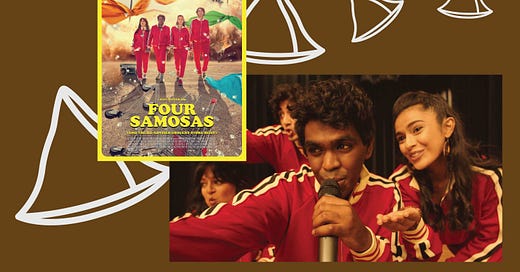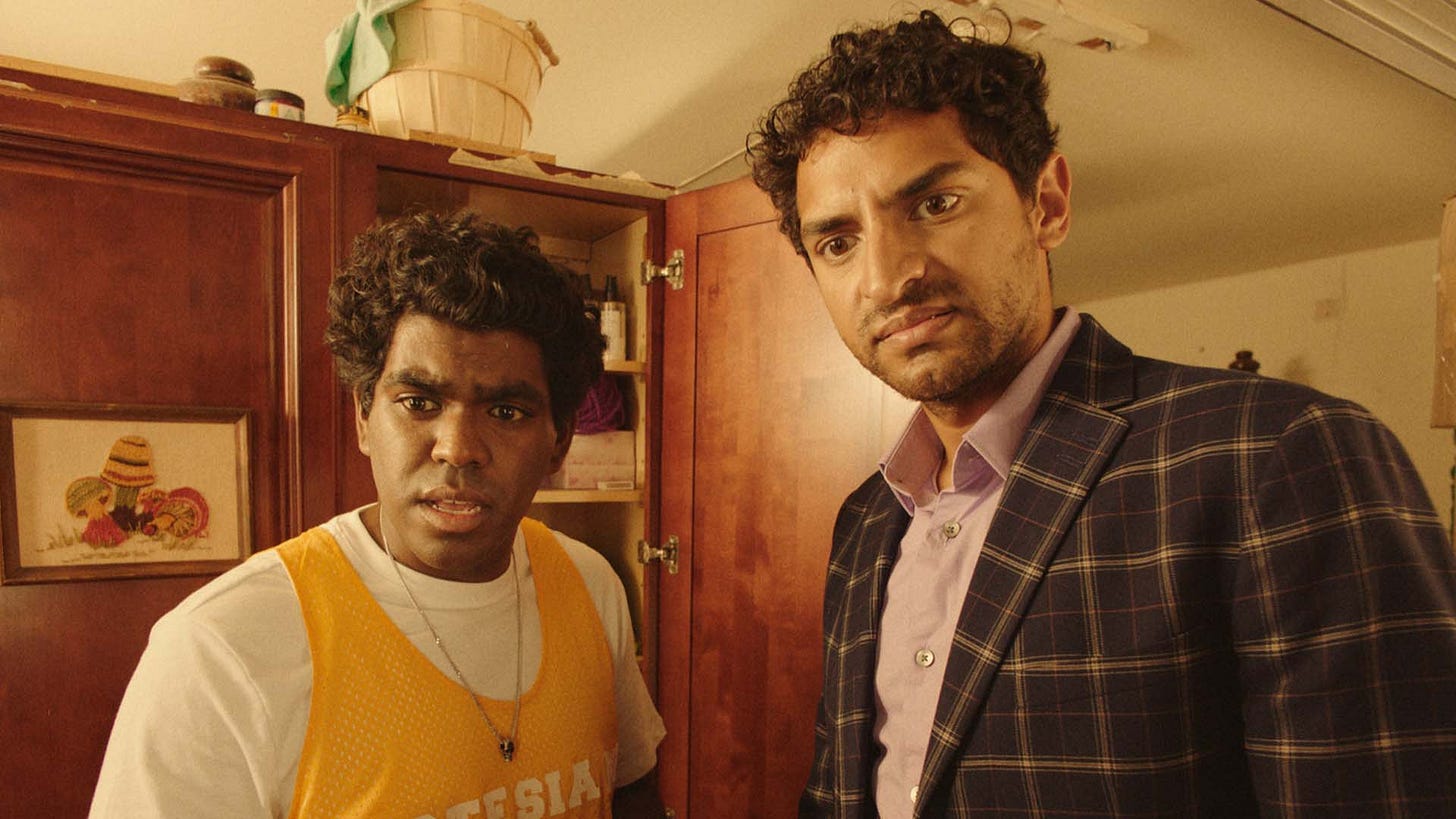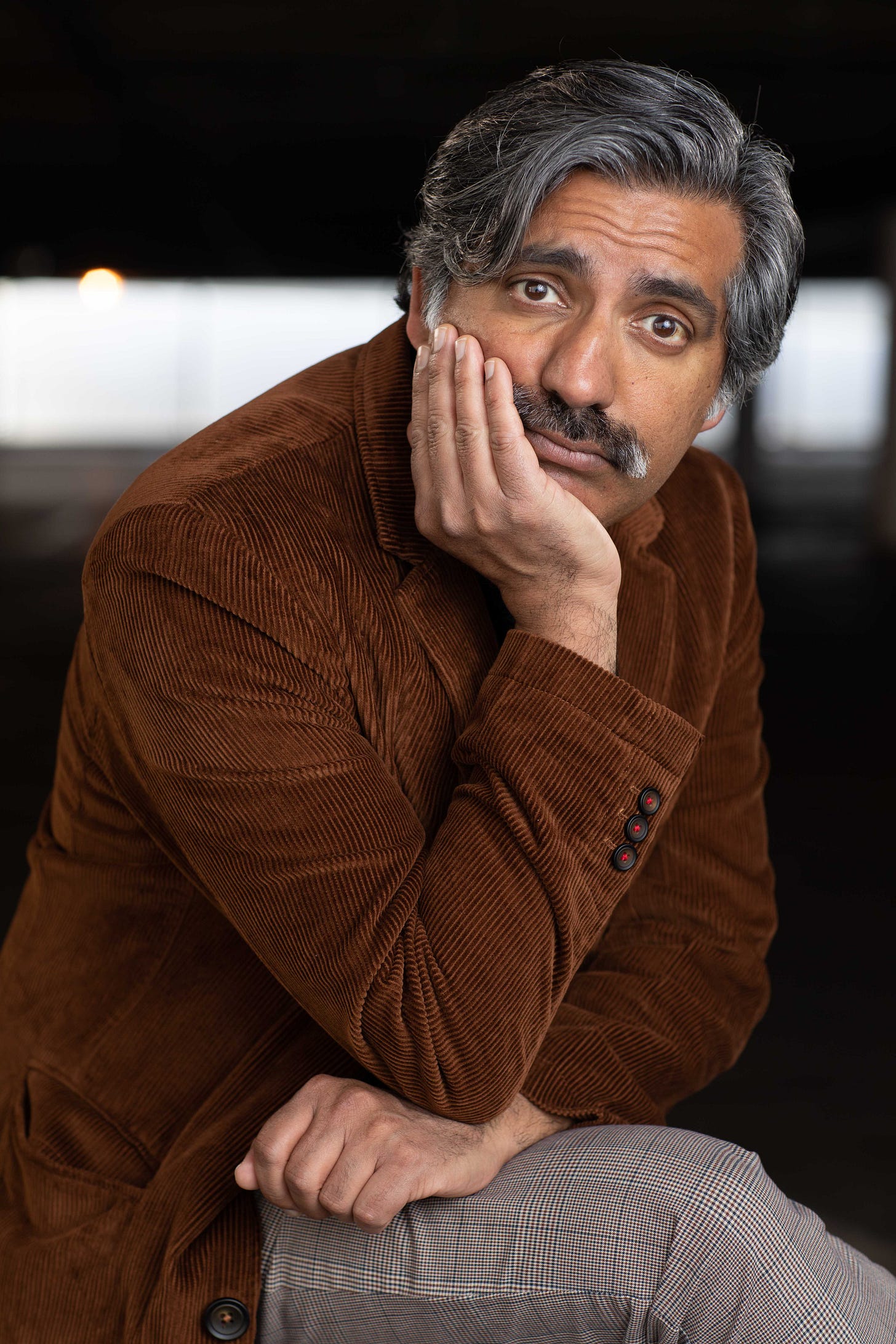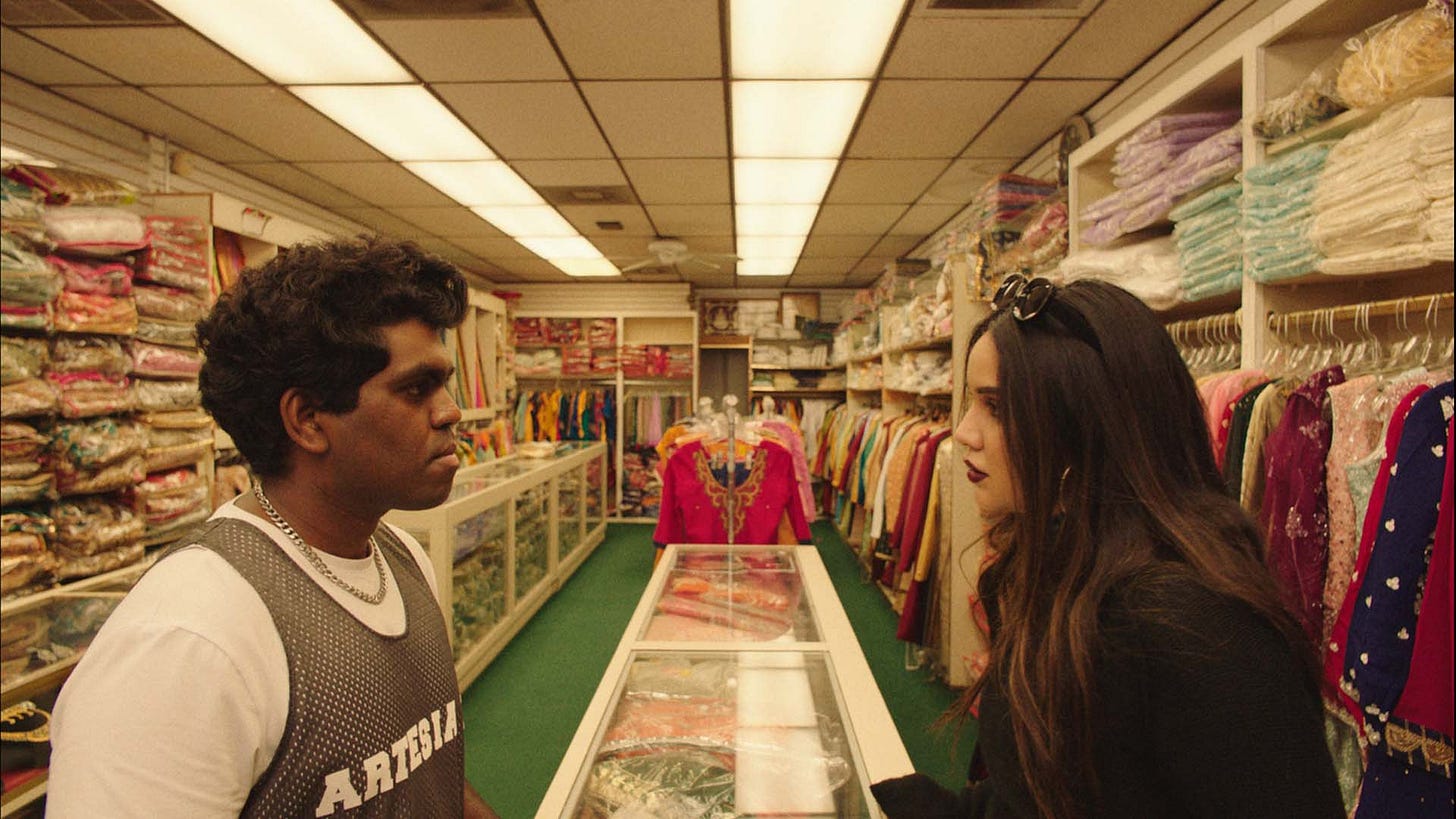Heist movie “Four Samosas” is really about finding your crew
This new feature film, set in Los Angeles’ Indian epicenter of Artesia, features several rising South Asian American creatives.
Issue #47
Hi all —
It’s so energizing to continue to see South Asian American creatives produce work that is getting recognized and featured by larger and larger platforms.
The new feature film, “Four Samosas,” stars an all-South Asian American cast and releases in theaters and on-demand today (Dec. 2). The movie has been highly anticipated because it premiered at the prestigious Tribeca Film Festival this year and the North American movie rights were then sold to IFC Films.
I got an early peek at the movie and spoke with “Four Samosas” writer/director Ravi Kapoor and lead actor/co-producer Venk Potula about creating this story. Check out the interview below.
Also, tune in virtually next week: Looking forward to continuing this year’s series of conversations with Asian American communities — now on Instagram Live. Join author and litigator Qian Julie Wang and I for a conversation about her memoir, “Beautiful Country,” on Wednesday, Dec. 7 at 9 a.m. PT/noon ET via @vigneshr on Instagram.
Thanks for joining the conversation,
Vignesh Ramachandran (@VigneshR on Twitter - well, for now, alas…)
Co-founder of Red, White and Brown Media
A Q&A with “Four Samosas” star Venk Potula and writer/director Ravi Kapoor
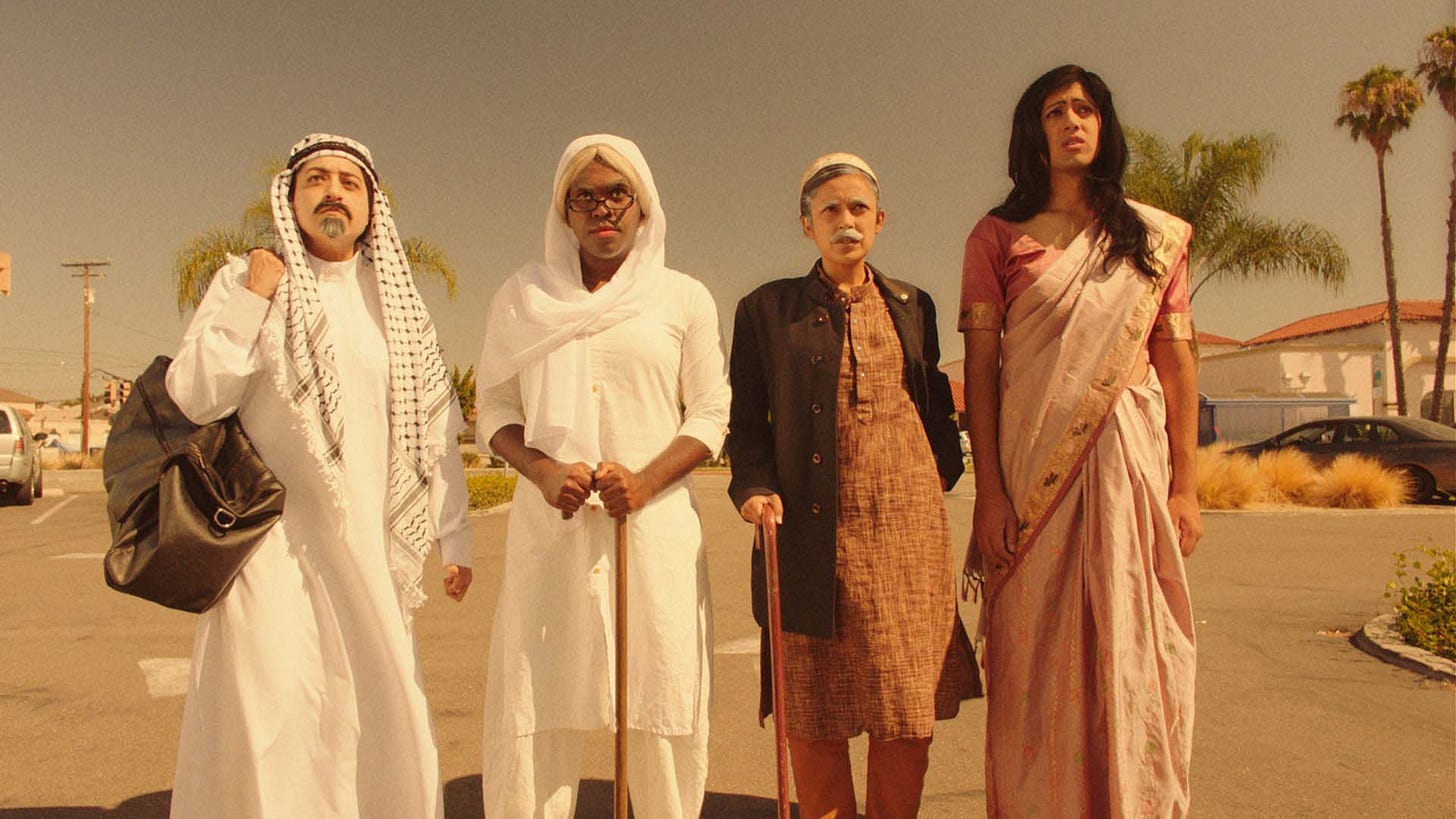
Everyone loves a good heist movie — that thrill we get hoping the protagonists don’t trip an alarm or get spotted by a bystander. But what makes new feature-length film “Four Samosas” unique is its setting and cast that blend the Indian American experience into the storyline.
The movie tells the story of four young adults who team up to steal the dowry of main character Vinny’s (played by Venk Potula) ex-girlfriend. The story is set in Los Angeles County’s “Little India” region in Artesia. Writer and director Ravi Kapoor said the movie was shot in just 16 days — fairly short for a feature film.
While the movie is notable for its cross-cultural story, Kapoor’s latest project also represents a collaboration that brought together several rising South Asian American creatives including Potula, Sonal Shah (“Mira Royal Detective,” “Scrubs”), Karan Soni (“Deadpool,” “Safety Not Guaranteed”) and Sujata Day (“Definition Please,” “Insecure”).
The following interview has been edited for length and clarity.
What was the inspiration behind writing the script for “Four Samosas”?
Ravi Kapoor, writer/director: Initially, I always just wanted to write a lo-fi heist film where there weren’t any guns, car chases or high-tech devices. It was just about the people and what they were going through as they were going through this process of stealing whatever they were stealing. That was the kind of initial impulse.
Then I always wanted to do something set in Artesia, which is Los Angeles’ Little India [region], just because I’ve always been fascinated by Little Indias everywhere — like these little principalities that you can go to, and you can kind of go home without going home in a weird way.
So I wanted to bring those two things together. That was the initial inspiration about wanting to write it. As I worked on it, it became about something else to some degree — about wanting to tell a story about finding your crew and finding your people and finding support in whatever you’re doing, and also about finding your artistic voice and figuring out what it is you want to say and have to say.
The movie features several South Asian American rising stars, including Karan Soni, Sonal Shah and Sujata Day. What was it like banding together with these other creatives on this project?
Venk Potula, lead actor/co-producer: I really just related to [my character Vinny] who was feeling a little stuck and feeling like maybe the best way to move forward is just to try something — even if it’s all going to fail.
When Ravi asked me to play the character, I was honored, but also equally honored and surprised when he asked me to co-produce it with him. So I think in some ways to work with everybody and to be a part of the process of finding our cast, and everyone that came together, it was really like making a heist, and trying to find all these people to pull off this kind of crazy thing. In some ways, I felt like I was living the character of Vinny off-screen as well.
It was amazing to be able to work with [everyone] — they’re all such incredible talents. We were very lucky to have them and they just fit their parts so well. On set, the chemistry was organic.
Through the setting of Artesia in the LA area, the movie shares an inherently diasporic experience. What is the value you think about telling diaspora stories in the U.S.?
Kapoor: If we don’t tell them, then this part of our history of being a diaspora community in America will be lost. If we don’t document it either through a documentary narrative or a fictional narrative — like we’re doing with “Four Samosas” — the future generations will look back and go: So hang on, who were we in 2022? What were we doing? What was going on in our minds? What was in the zeitgeist of being a South Asian American or South Asian immigrant? If we don’t have these stories there, then we won’t have them to look back on and understand our history of being here in this country.
It is really important that we tell these stories. And it’s important that we’re the ones to tell them, as well, just because I think we can tell them a little bit more authentically. We can also choose what we feel are the most important stories or the most important themes that we need to tell. If we just leave it to the powers that be — the people who are the gatekeepers — then they might just want to keep telling the same stories about us, just the arranged marriage story all the time over and over again. It’s important that we go: Actually, there are other things about us and about our experience here.
Venk, on your personal website you write about how when you “struggled to find opportunities” you “created them instead.” That’s something similar we’ve heard from other South Asian American creators (like Sujata Day) in Hollywood. Tell us about that and what this moment means being a creative collaborator on “Four Samosas.”
Potula: It’s huge. It’s everything. Like what Ravi said: If we don’t tell these stories, they’re just not going to get told. They will come from us from the ground-up, instead of the top-down.
As an actor, I would go in for parts and never quite felt like the art of it really led to anything meaningful. I always felt I had the capacity to do other things, as well. Like, I was good at math, which I used to actually be really self-conscious about, because I was like: Actors shouldn’t be good at anything other than just acting. [Then] I was like: Oh, this is weird. I’m also in grad school right now getting a business degree and a film producing degree.
So I feel that this idea of a creator or an actor is being very much reinvented by creators. I look at Issa Rae, Donald Glover, Aziz Ansari or Sujata Day creating their own opportunities. I started with short films, and it started with whatever I could get my hands on. That it has led to making this film, a first feature, where I have the pleasure to be involved in the ways that I am, it’s amazing — it really is so much more satisfying when you build the house and invite people in. I always think about being a host and wanting to make sure that when you provide opportunities for others, it’s a gift and I get so much more out of it really.
Kapoor: I love what Venk said in terms of building a house and inviting people to come play in your house. That was very much the kind of way this all happened. We didn’t do any auditions. I think we auditioned for one character — everything else was about just offering people the parts and asking them if they would come in and help us tell the story. Because we know the community, we know how brilliant everybody is, and we know when people can nail it and when something is just so in their lane. That was such a pleasure to be able to make this thing.
“Four Samosas” premiered at Tribeca, and then IFC Films bought the rights. What was that process like showing the movie at film festivals and selling this story in particular?
Kapoor: It’s been incredibly great and gratifying in terms of seeing the reaction to it right from Tribeca. Personally, I didn’t know what we had until Tribeca. I’m always looking at everything I do and go: Oh God, what have I done? It’s terrible. So it was very gratifying to get to Tribeca and have a really great reaction. Then to see a company like IFC come aboard and say: Yeah, we agree, it’s a really good film and we think that it’d be a great thing for us to get behind and do the North American distribution for.
What it says for us as well is that this is a film that can reach beyond the South Asian community, too. Ultimately, it is a very relatable film: It is a heist film, it is a love story. What makes it special about being set in the South Asian community is a positive for people who are not South Asian, because it gives them another layer that they would never have seen before in a regular heist film.
This is inherently an American story. Are gatekeepers — streaming services and studios — starting to recognize more nuance and showing more interest in diverse South Asian American stories?
Poutla: It’s hard to say, because I think we need more “Four Samosas” to bring into conversations with gatekeepers. It’s hard for someone who doesn’t have an understanding of the cultural background to get it. We need to be given a creative license to have more freedom in how we want to approach telling our stories.
Gatekeepers can sometimes be negative word, but I think it’s also partners — the studio executives, development executives — I think they are kind of trying to find ways to make things a little bit different and tell a new story. But at the same time, I think familiar and something that works is always safer in some ways. It does take a little bit more of a risk to try and change things up. That’s my personal belief. I don’t know if that’s going to happen from within a studio system. This is why independent movies are so important, because it gives … breath to voices that would never normally be made in that traditional studio setting.
The movie premieres to the wider public on Dec. 2 (today). But what has reaction been so far from people who have seen the film so far?
Kapoor: We’ve done a lot of festivals since Tribeca, as well. So we’ve had a chance to be there in the room as people have been watching, and then doing a lot of Q&As afterwards. The general response has been I think people feel a sense of warmth about this film — they kind of come away feeling good and positive. I think it is a film which isn’t cynical, even though it’s a comedy. I think a lot of comedies these days tend to come from a very snarky, cynical kind of place, whereas this one has a very pure heart to it, and that’s got a lot to do with the casting as well.
There is an openness and an honesty and a generosity to the film. That’s what people have really been responding to — and they’ve been coming away feeling happy.
Do you feel like there’s a growing community of South Asian American creative talent to inspire more collaborations like this?
Kapoor: It’s getting bigger — the number of people who are the creators and the actors and the producers and the agents and managers. It’s blowing up in terms of the South Asian involvement. I think what that kind of means, in some ways, is that it’s impossible to bring everybody together, because there’s so many people. So there’s going to be these separate people that know people in this group, and people want to work with people in that group. That’s inevitable, just because there are so many now. And I think that’s a great thing. That speaks to how much more ingrained we are becoming as storytellers within the American storytelling community.
What’s next for you?
Potula: I’m also a storyteller as well. I’m going to be sending some scripts to Ravi soon for some notes. As I’ve always done since the first short film, I think leaning into that multi-hyphenate even more so is the kind of projects that I’m going to be doing.
At the end of the day, I love telling stories of people of color. I’m from Atlanta, and I had an interesting upbringing where I was a South Asian kid that just didn’t grow up around South Asian people. So I ended up finding lots of different communities that I’ve intersected with. I always find that cultural intersection to be really fascinating and interesting and how it all kind of pans into this narrative about what it means to be American.
“Four Samosas” opens in several theaters across the United States and via on-demand today, Dec. 2.
Your Thoughts
Please send a WhatsApp message to 646–481–3221 or email us to share your feedback, story ideas or anything else you’re thinking about these days:
Red, White and Brown sparks conversations about South Asian American communities. Please tell your friends and family to subscribe to this newsletter and follow select posts on Medium.


